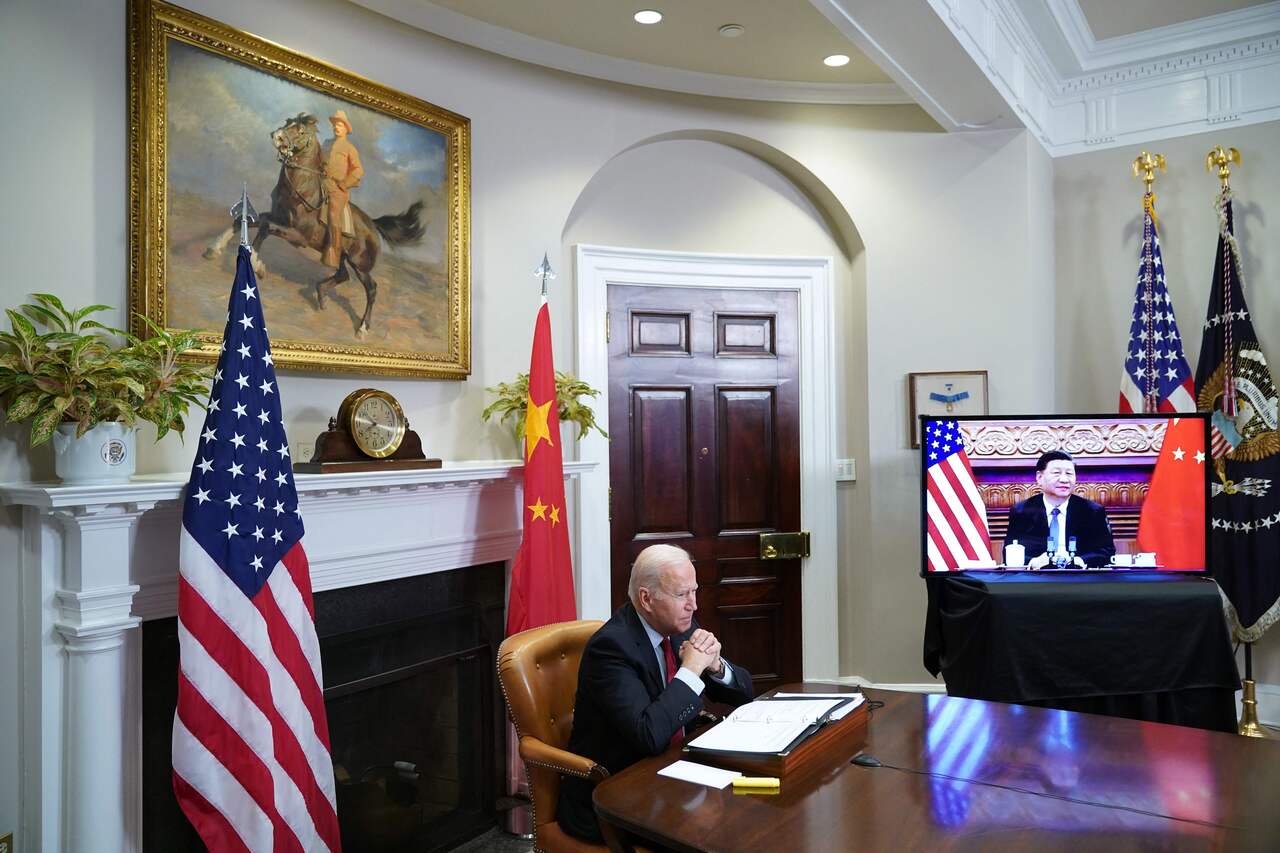Bloomberg New Economy Forum
A victor in US-China clash is not possible without destroying humanity: Henry Kissinger
Sign up now: Get ST's newsletters delivered to your inbox

The virtual summit between Chinese President Xi Jinping and his US counterpart Joe Biden is a "good beginning", said Dr Henry Kissinger.
PHOTO: AFP
SINGAPORE - While the United States and China view each other as technological and economic competitors, both sides must realise that a victor is not possible without risking the destruction of humanity.
They must move away from this posture towards attempting to mitigate disputes, said former US Secretary of State Henry Kissinger at the Bloomberg New Economy Forum in Singapore on Wednesday (Nov 17).
Hence Tuesday's virtual summit between Chinese President Xi Jinping and his United States counterpart Joe Biden is a "good beginning", he added.
During a conversation moderated by Bloomberg editor-in-chief John Micklethwait, which Mr Kissinger attended virtually, he acknowledged that public opinion in the US has shifted towards seeing China as a rival.
But the world will be better off if it deals with pressing issues such as climate change, artificial intelligence (AI) and economic relationships in a mutually beneficial way, he said.
"Both the United States and China have to accept that major (technological) powers of comparable capacities must attempt to compose their differences to a level in which co-existence becomes not only possible, but essential."
He noted that both sides had made progress on climate change, and there are other issues such as nuclear proliferation where cooperation is of the greatest importance.
The US and China, the world's top two greenhouse gas-emitting countries, made a surprise announcement at the COP26 climate conference last week that they had agreed to cooperate to limit emissions.
He added that if both sides do not have sufficiently compatible views to permit cooperation, then the least they can do is to prevent movement towards conflict.
To Mr Micklethwait's question on whether he thought the Chinese had good intentions and wanted to cooperate, Mr Kissinger said it was not his job as a student of foreign policy to "psychoanalyse" the Chinese regime.
The task of Americans and non-Chinese, he added, is to understand what they need to do to make sure that there is at least equivalence, and no subordination, in key areas of interest.
"I assume the Chinese leaders will work towards the maximum capability of their country... It should be possible to make arrangements by which the level of competition is reduced to a point that makes even cooperative measures possible.
"I'm assuming that China will operate at a high level of its capacity, because it is a Confucian tradition and it is inherent in Chinese history. It is our obligation to work at an equivalent level of capacity, and then to ask ourselves whether the world will not be better off if we deal with the outstanding issues... from the point of view that leads to benefit for both sides."

Former US Secretary of State Henry Kissinger participating in a virtual conversation at the Bloomberg New Economy Forum on Nov 17, 2021.
PHOTO: BLOOMBERG
As for Europe's role in today's geopolitics, he said the relationship with Europe has been a central feature of American foreign policy.
But the problems of the Atlantic partnership had on the whole to do with Russian challenges, and the Chinese challenges today are of a different cultural and substantive nature, he said.
"So we cannot automatically apply all the lessons of Europe to the conditions of Asia. But I would expect that, in a general sense, Europe would look at America's problems in other parts of the world with sympathy and with understanding.
"The overall lines of policy should be that Europe and the US cooperate, with allowances for specific conditions that may exist by country or region."
On US-China rivalry in AI, he said AI represents a departure in human thinking comparable to that which produced the Enlightenment. A whole new school of intellectual evolution is bound to develop when results are achieved through an algorithmic understanding of events.
He cautioned that there are risks to dealing with this in entirely competitive terms: "If we try to determine who is superior, and if we don't even know how to define what a level of superiority is which is strategically useful, we could be engaging in a race which, as a result of accidents, leads to consequences which we cannot foresee."
Mr Kissinger expressed hope that a way can be found by which technological discussions between the US and China take place, that will also permit an adjustment in how the issue of economic competition is broached.
"Neither side will accept a permanently inferior standing, but both sides have to understand that the other will not concede a permanently superior standing," he said.
"So a dialogue that starts from these realities is essential. There can be no winners in an AI race if both sides do what they need to."


